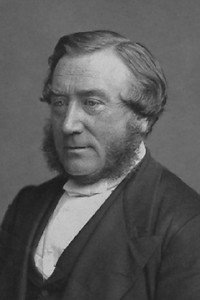John W. Kennedy (15 August 1819 – 28 April 1884), usually known as John Kennedy of Dingwall or simply Dr Kennedy at the popular level, was a Scottish minister of the Free Church of Scotland. He was minister of just one church, in Dingwall, for forty years from his ordination in 1844 until his death.[1][2]

Biography edit
Kennedy was born in Killearnan and studied at King's College, Aberdeen. He was converted in 1841, after he had already started training for the ministry, and shortly after the death of his father, John Kennedy of Killearnan.[3][4][5] Kennedy was licensed to preach by the established Church of Scotland in September 1843, but then joined the Free Church, being inducted into the newly formed congregation at Dingwall in February 1844. He married Mary MacKenzie in 1848.[1]
Kennedy became the leader of the Highland Evangelicals.[6] According to John Noble, "Christ was the centre and sun of his preaching."[5] Alasdair J. Macleod argues that Kennedy "emphasised personal piety, self-examination of religious experience, and theological orthodoxy."[7]
Kennedy championed exclusive psalmody and the doctrine of limited atonement,[8] and was opposed to confessional revision,[5] union with the United Presbyterian Church (which eventually occurred in 1900), disestablishmentarianism, and instruments in worship.[1] He also spoke against the higher criticism of William Robertson Smith and what he called the "hyper-evangelism" of Dwight L. Moody.[4]
In 1861, Kennedy wrote The Days of the Fathers in Ross-shire and in 1866 The Apostle of the North, a biography of John Macdonald. He was granted an honorary Doctor of Divinity degree by the University of Aberdeen in 1873.[1]
Kennedy was allied to Hugh Martin and James Begg in theological causes.[4] He was also friends with Charles Spurgeon, who after Kennedy's death said of him, "True as steel and firm as a rock, he was also wonderfully tender and sympathetic."[8] According to John Macleod, "the great Puritans had no more eminent successor in the Scottish ministry in the 19th century."[5]
References edit
Citations edit
- ^ a b c d "Kennedy, John (1819-1884)". Dictionary of National Biography. London: Smith, Elder & Co. 1885–1900.
- ^ Macleod, Alasdair J. (2018). "John Kennedy and the Development of Evangelicalism in the Scottish Highlands, 1843–1900" (PDF). University of Edinburgh. p. 14. Retrieved 2 November 2022.
- ^ Scott 1928.
- ^ a b c Isbell, Sherman. "Historical Introduction". The Highway. Retrieved 1 November 2022.
- ^ a b c d "The Prince of Highland Preachers". Free Presbyterian Magazine. Free Presbyterian Church of Scotland. April 1999. Retrieved 2 November 2022.
- ^ Macleod, Alasdair J. (2023). John Kennedy of Dingwall, 1819-1884. Edinburgh University Press. Retrieved 1 November 2022.
- ^ Macleod, Alasdair J. (2020). "The Days of the Fathers: John Kennedy of Dingwall and the Writing of Highland Church History". Scottish Church History. 49 (2): 123–140. doi:10.3366/sch.2020.0032. S2CID 234673192. Retrieved 2 November 2022.
- ^ a b "Memoir of Rev John Kennedy, D.D., of Dingwall". Retrieved 1 November 2022.
Sources edit
- Auld, Alexander (1887). Life Of John Kennedy, D.D. London: T. Nelson & Sons.
- Kennedy, John (1877). Disruption worthies of the highlands. Edinburgh: J. Greig & Son. pp. 17-24.
- Kennedy, John (1866). The "Apostle of the north." The life and labours of the Rev. Dr. M'Donald. London, New York [etc.]: T. Nelson and sons.
- Kennedy, John (1992). The Saviour. Stornoway: Reformation Press. ISBN 9781872556031.
- Sell, Alan P. F. (2004). "Kennedy, John (1819–1884)". Oxford Dictionary of National Biography (online ed.). Oxford University Press. doi:10.1093/ref:odnb/15386. (Subscription or UK public library membership required.)
- Scott, Hew (1928). Fasti ecclesiae scoticanae; the succession of ministers in the Church of Scotland from the reformation. Vol. 7. Edinburgh: Oliver and Boyd. pp. 13.
External links edit
- "John Kennedy of Dingwall," lecture by W. J. Seaton
- "Kennedy, John, (of Dingwall)" at Reformed Books Online